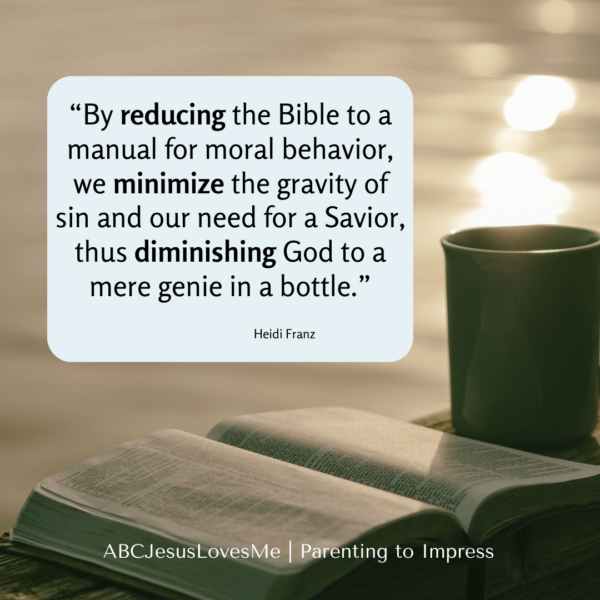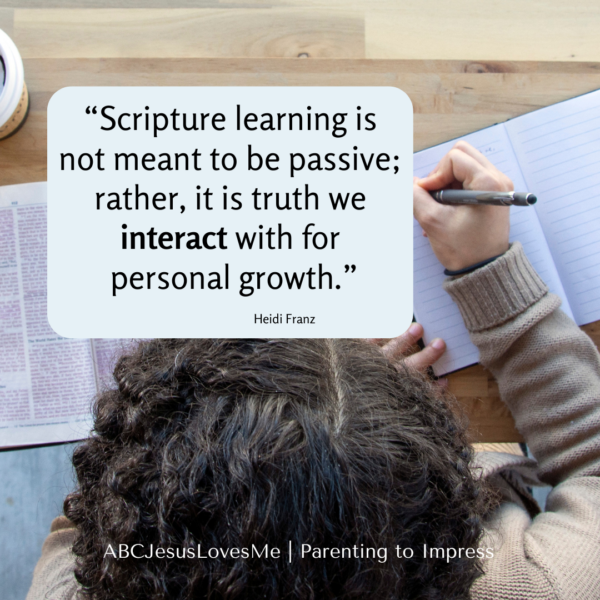2 Timothy 3:16-17 says, “All Scripture is God-breathed and is useful for teaching, rebuking, correcting and training in righteousness, so that the servant of God may be thoroughly equipped for every good work.” This verse encapsulates my prayer for my children to not only know God’s Word but also to apply it in every situation they encounter, thus preparing them “for every good work.” However, the transition from learning Bible stories to applying them can be challenging for children. Let’s explore some ideas per age group.
▼ Jump to Listen to Episode #49: Teaching Children Application of Biblical Principles ▼

Apply the Bible in Preschool Years
Guiding a child’s spiritual path can be daunting, particularly when it comes to making the Bible relevant. During the foundational years of a child’s life, my goal is less about application and more about teaching what the Bible is. It is…
- Truth.
- God’s Word to us.
- Written by men who were inspired by the Holy Spirit.
- True stories that actually happened.
Everything in the Bible tells us more about who God is, His character, and His attributes. The stories provide glimpses of how God’s goodness for us emanates from who He is. Remind your kids that God is good, and He loves them so much. Even in their sin, walk alongside your child, helping them see that God has a better way.
Use the preschool years to introduce biblical words like gospel, good news, sin, disobedience, grace, and mercy. But don’t oversimplify the Bible into ‘if-then’ moral tales. If I am nice, Jesus will love me. If I obey, God is happy. If I tithe, God will give me more. By reducing the Bible to a manual for moral behavior, we minimize the gravity of sin and our need for a Savior, thus diminishing God to a mere genie in a bottle.

Apply the Bible in the Elementary Years
During the elementary years, I aim for the child to not only grasp the facts of the Bible but also understand the ‘why’ and ‘how’ behind them.
After reading a Bible story, we discuss…
- What did the different people in these stories do?
- Why did they do this?
- Do you think it was a good choice?
- Do you think it was a bad choice?
- What were the ramifications from their choices?
- How did God respond to their choices?
If the child gives a “wrong answer” to any of these questions, I ask, “Why do you think that?” or “Why would you do that?” Sometimes, allowing time for the child to reflect on the conversation opens opportunities to later ask, “Do you still believe that?” This gives space for the Holy Spirit to work on the child’s heart.
Passing the baton of spiritual ownership also begins during this time. Proverbs 22:17 says, “Pay attention and turn your ear to the sayings of the wise; apply your heart to what I teach.” Scripture learning is not meant to be passive; rather, it is truth we interact with for personal growth. Discover specific cultivating ideas for each age group in the previous podcast.

Apply the Bible in the Teen Years
The teen years are when the Bible stories come to fruition. I believe this is the time when I can aid my teens in understanding how the ancient text applies to their 21st-century lives. For example, the Bible doesn’t talk about texting, cars, or going out with friends. But the Bible does address topics such as lust, making wise decisions, and the company we keep.
Proverbs 23:12 says, “Apply your heart to instruction and your ears to words of knowledge.” It is important that our teens grasp the idea that God is concerned about our hearts and our motive. Why do we do the things we do? He desires that our hearts be open to wisdom and direction, enabling us to make decisions based on what we learn through His Word.
I have found power in asking the question, “What do you think?” This prompts my teens to formulate an answer and support it. Lord willing, this will lead them to what the Bible says. Here are some more questions to ask:
- What does the Bible say?
- What Scripture verse or story talks about this topic?
- How does this story or verse apply to your situation?
- What Bible verse or story led you to that conclusion?
- What does God think about this? How do you know?
- Now that you know what God says, what should you do next?
In conclusion, guiding your child’s spiritual journey is a significant task, but it is not insurmountable. It is laying a foundation upon a foundation. First, spend time in the Word teaching your children the stories. Second, discuss with your children about God and how His Word applies to their lives. Third, pass the baton and guide the child to see what God’s Word means to them without parental involvement. Encourage your child to tune in to God’s voice and search for answers in His Word.
You will make mistakes on this journey. And what works with one child may not work as effectively with next. But as Galatians 6:9 reminds us, “Let us not become weary in doing good, for at the proper time we will reap a harvest if we do not give up.”
#49: Teaching Children to Live Out Biblical Principles
Discover more ideas in the podcast or transcript.
Did Your Enter to Win?
The $10 Amazon gift card opportunity from The Chosen is still open for entries. Simply click the link to enter to win. See details in last week’s post. US residents only.
